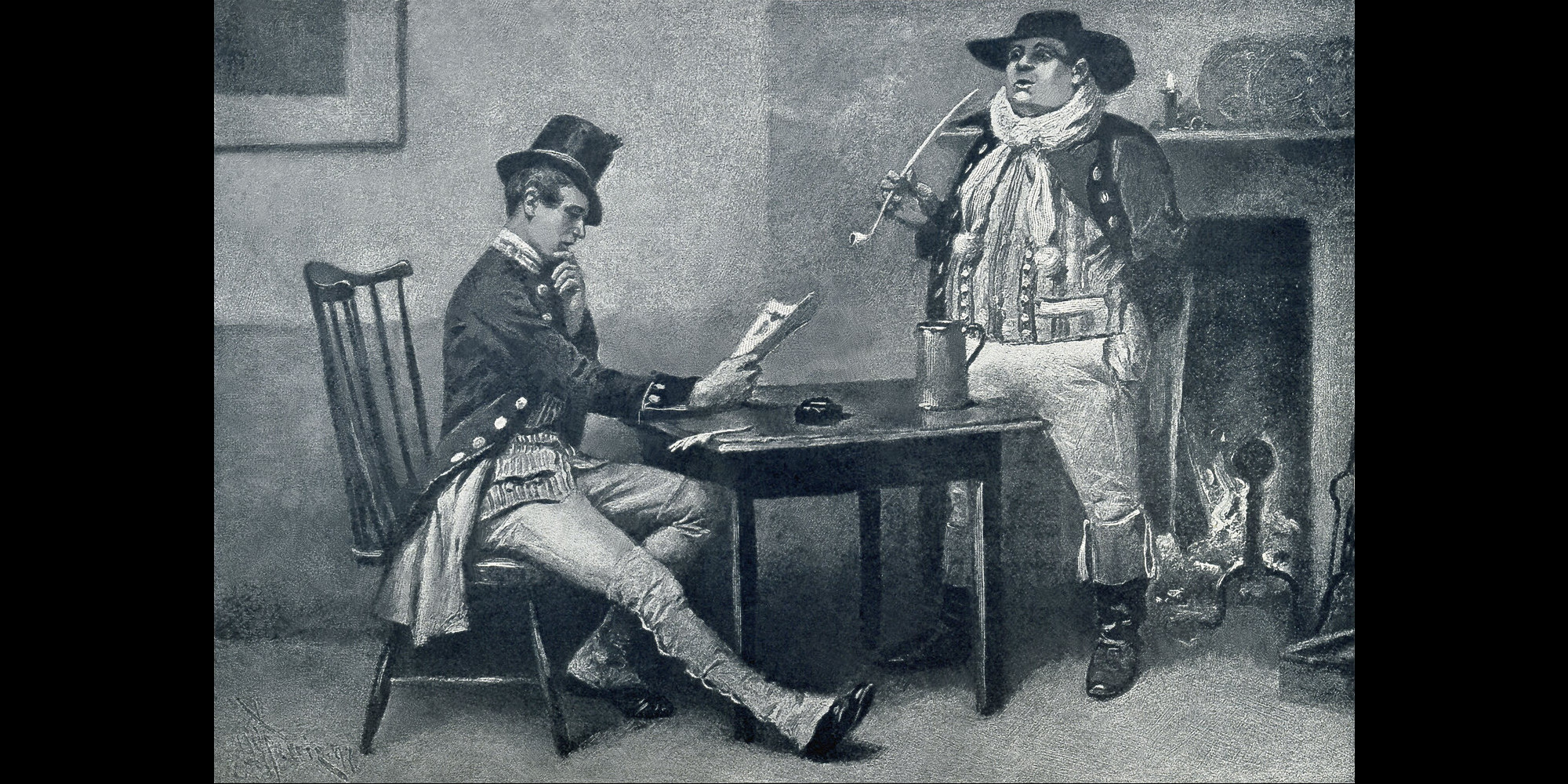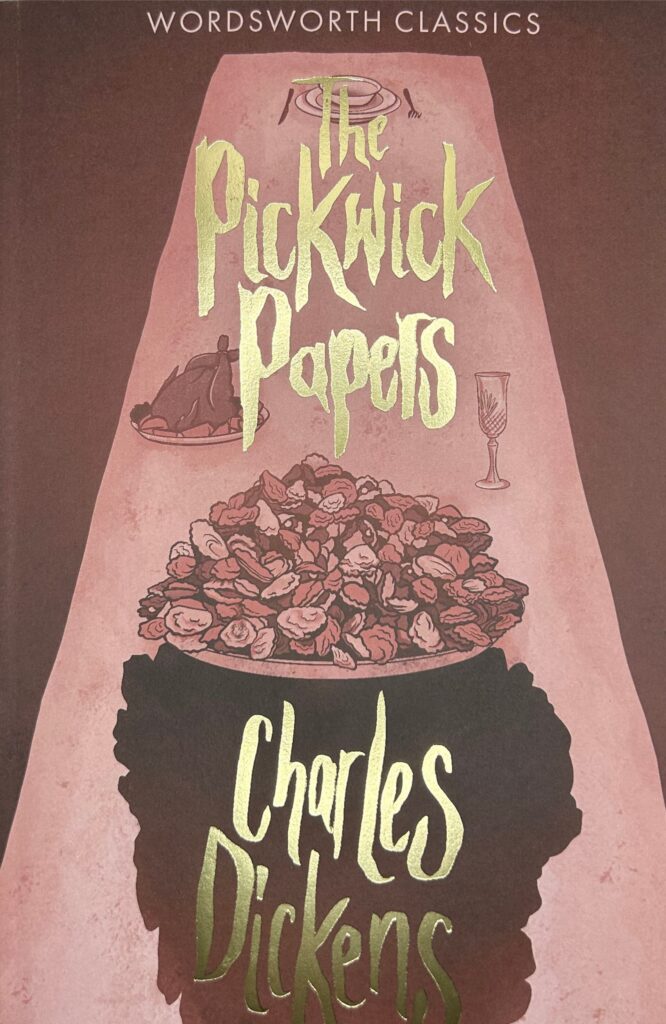
David Ellis looks at The Pickwick Papers
David Ellis looks at Sam Weller, one of Dickens’ earliest and most popular characters.
A quarter of a century ago, I wrote an introduction to the Wordsworth Classics’ edition of Pickwick Papers. I was happy to do this because, at that time, I was puzzling over how to write sensibly about comedy (I still am!). Dickens finds myriad ways to be funny in Pickwick, several of which raise important issues. Towards the beginning of his book, for example, he describes the courtship of Mr Tupman and Miss Wardle, that traditional comic topos of elderly love. As these two begin kissing, they fear they are being observed by a character Dickens has already established as `the fat boy’, although that seems doubtful to Mr Tupman since one of the peculiarities of this individual is that he is continually falling asleep. As I hinted in my introduction, it would make a difference to our enjoyment of the episode if Dickens had suggested that the boy’s obesity as a consequence of a glandular malfunction rather than over-eating, and if there had been in his day such a well-defined medical condition as narcolepsy.
`We laugh at deformed creatures’ writes Sir Philip Sidney and it is still the case that a good deal of comedy is cruel in that it is focused on physical or mental disabilities: Dudley Moore’s well-known impersonation of the one-legged man applies to Peter Cook for the role of Tarzan would be a good illustration. The fat boy is not a complex creation but he is near the beginning of a long and splendid line of comic characters Dickens will go to invent, participating as he does so in a distinguished tradition which we can think of as beginning with Falstaff (not so slim himself), and coming right up to our own time with figures such as the pub landlord, Alan Partridge, Count Arthur Strong, as well as the magnificent Dame Edna or Sir Les Patterson. Another early character in Pickwick who is hardly complex is Mr Jingle, since he is based on a peculiarity of speech and never so funny as when he first appears and describes the perils to which tall mothers who travel on the top of coaches are exposed: `sandwich in her hand — no mouth to put it in — head of a family off — shocking, shocking!’. Jingle is a fortune hunter and it is he who runs off with Miss Wardle and is then tracked down to a London inn where we are first introduced to Sam Weller. It is possible to think of Sam as a descendant of those slaves who are cleverer than their masters in the Latin comedies of Plautus and Terence but, as Dickens develops him, he becomes the very prototype of the resourceful and irrepressible cockney.
One episode in Pickwick I remember being particularly struck by involves Sam consulting his father on the composition of a valentine. What it now brings to my mind is that most familiar and, at the same time, much-derided `theory’ of comedy which in our culture is usually taken back to Thomas Hobbes and which claims that we always laugh at someone, chiefly because of how they are, or what happens to them, offers a sudden reinforcement of our own sense of superiority. According to this theory, we laugh at the boy because he is fat and sleepy (always supposing of course that we ourselves are not obese or narcoleptic), just as we laugh at Sam and his parent’s compositional efforts because, as members of the book-buying public, we have a better sense than they have of how valentines should be written, and of standard English usage:
`“Feel myself ashamed, and completely cir –” I forget what this here word is’, said Sam, scratching his head with the pen, in vain attempts to remember.
`Why don’t you look at it then?’, inquired Mr Weller.
`So I am a lookin at it’, replied Sam, `but there’s another blot. Here’s a “c”, and an “i”, and a “d”’.
`Circumwented, p’raps’, suggested Mr Weller.
`No, it ain’t that,’ said Sam, `circumscribed; that’s it’
`That ain’t as good a word as circumwented, Sammy,’ said Mr Weller, gravely.
Like most people, I find these exchanges funny but lurking behind them, as always when highly literate authors are displaying the linguistic or intellectual incompetence of those below them in the social scale, is the danger of condescension. In Pickwick, this is largely circumwented by the fact that, in matters other than the writing of valentines, Sam Weller is regularly shown to be infinitely more competent and intelligent than those around him. In the opening section of the gravedigger’s scene in Hamlet (to take a rather different example!), Shakespeare is having fun with the way two poorly educated working men are handling complicated legal distinctions, but what helps prevent us from feeling condescending towards them is that their exchanges are a cover for a quite daring critique of a situation whereby society’s nobs are allowed to top themselves without religious penalty while the bodies of those less privileged individuals who have committed suicide will be thrown immediately into the unhallowed ground.
The manner in which Sam Weller is developed, once he becomes the servant of Mr Pickwick, throws light on another theory of comedy almost as well known as the one associated with Hobbes. This derives from the book by Freud which purports to be confined to jokes but which often strays into the general area of the comic. There are ideas in this book about why we laugh that are very strange. According to Freud, in a mood which could be described as thermodynamic, most humorous remarks are based on material that wells up from the unconscious and the pleasure or relief we feel when we hear them expressed or express them ourselves — indirectly, as in the manner of dreams, although not quite so obscurely — derives from the economy of psychic expenditure we make in no longer having to repress them. It is a consequence of these ideas that many commentators have been tempted to assume that all jokes, and comedy in general, must be subversive. The distinguished anthropologist Mary Douglas, for example, in a highly influential essay on joking rituals and jokes in general, has written: `All jokes have .. a subversive effect on the dominant structure of ideas’. But this is no more the case than that all comedy makes us feel superior. Sam Weller is not himself of course a joke, but what would be is the notion that the comedy he creates is in any way subversive. Dickens is often an open critic of his society in Pickwick, regularly inviting his readers to pour scorn on the political class or the legal system. But Sam becomes such a devoted servant of Mr Pickwick, protecting him as a mother does her child, loyally arranging to be incarcerated so that he can continue to attend to him, and generally always sacrificing his own interests (even those represented by the composition of the valentine) to those of his employer. At a period when there were more people in domestic service than in any other kind of work, and someone who could buy a book could probably also afford at least one maid of all work, master/servant relations must have been a recurrent subject of anxiety.
To have such an idyllic comic representation of how they are managed by Sam and Mr Pickwick was hardly likely to subvert any established values, or keep Dickens’s readers awake at night.
Books associated with this article
